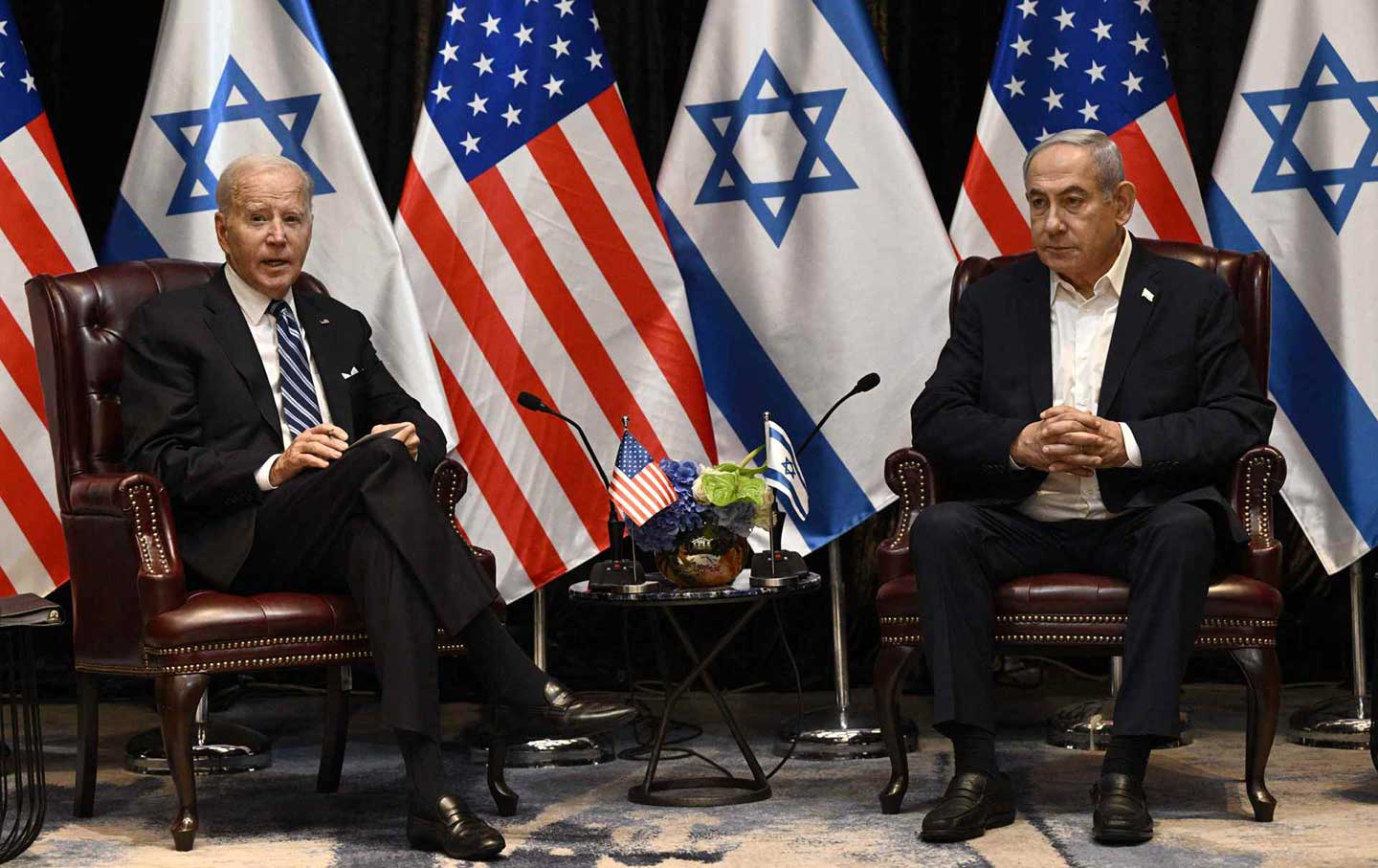The president’s promise of restraint is repeatedly belied by the reality of continued escalation.
President Joe Biden delivers remarks at the St. John Baptist Church in Columbia, S.C., on January 28, 2024.
(Kent Nishimura / AFP via Getty Images)
Joe Biden and his political allies continue to be dogged by protesters calling for a cease-fire in Gaza, their shouts now fixtures at Democratic events. Although Biden rejects their policies, he knows he has to be careful about respecting their advocacy, since most Democrats share at least a portion of their anti-war position. A poll conducted in late 2023 by Data for Progress showed that 76 percent of Democrats support a cease-fire. A more recent Economist/YouGov poll shows that 49 percent of Democrats believe that Israel is committing genocide in Gaza—against only 21 percent who reject the genocide description and 30 percent who say they don’t know. Support for the genocide description is particularly strong among the young and people of color, essential constituencies for Biden’s reelection: 40 percent of Blacks, 46 percent of Hispanics and 49 percent of voters 18–29 believe Israel is committing genocide. These are plurality positions in each cohort.
Given the fact that the anti-war position is so popular among his base, Biden has been careful to try to at least appear respectful of protesters even as his government continues to offer extraordinary military and diplomatic support for the onslaught in Gaza. Responding to protesters on January 8 as he spoke in Charleston, S.C., Biden said, “I understand their passion. I’ve been quietly working with the Israeli government to get them to reduce and significantly get out of Gaza.”
Biden is forcing the modest adverb “quietly” to carry a very heavy load here: an entire argument on Biden’s behalf against all the doubters, including people who might not publicly protest but are deeply troubled by daily images of the starving, maimed, and slaughtered residents of Gaza. The president and his supporters have tried to quell the fissures inside the Democratic coalition by emphasizing his alleged quiet diplomacy. In a reversal of the Wizard of Oz, we’re supposed to ignore the loud public face of Biden’s diplomacy that arms Israel and defends it in the diplomatic arena and instead put our faith in the demure, soft-spoken man behind the curtain, the covert Biden who is allegedly engaged in sub rosa diplomacy to force Israeli Prime Minister Benjamin Netanyahu to heed the better angels of his nature.
Let’s stipulate, for the sake of argument, that Biden is being honest here about his behind-closed-doors role. Even so, we must still conclude that quiet diplomacy has been a disastrous failure, since the Middle East continues to spiral out of control. Not only is Israel’s war against Gaza intensifying, but the United States is becoming increasingly implicated in actual fighting. American troops are widely dispersed in the Middle East and increasingly finding themselves fighting regional militias. These groups are often described as “Iran-backed”—which is largely true in the sense of funding, but they represent disparate forces that aren’t necessarily working in coordination. What they do share is a common hostility toward American hegemony in the region. The war in Gaza has given these groups a new incentive to engage in asymmetrical battles with the United States. The most notable of these groups is the Houthis, a militia that controls roughly 80 percent of the population of Yemen and is now openly fighting the United States and its allies as part of an effort to blockade the Red Sea to limit Israel’s military capacity.
Biden’s quiet diplomacy might sound demure, but it’s already led to explosive violence, with five American soldiers dead so far. Last week two Navy seals died as part of an anti-Houthi operation. On Sunday a drone attack on the Syria/Jordan border led to the killing of three more American soldiers and the wounding of roughly 30 more.
Responding to this news, Trita Parsi, vice president of the Quincy Institute, noted that the soldiers “didn’t die defending US interests, they died defending Biden’s refusal to press Israel for a ceasefire. Their lives were put at risk by Biden to defend Israel’s ability to continue its carnage in Gaza.”
Current Issue

Predictably, the hawks in Washington—notably Republican Senators John Cornyn and Lindsey Graham—responded to the news with calls to “target” and “hit” Tehran. Washington Post columnist Max Boot argued, “To get Iran’s attention, the United States needs to target Quds Force personnel in Yemen, Iraq, Syria or Lebanon” (Qud Force personnel being Iranian Revolutionary Guard soldiers in the region). This saber-rattling makes clear that the long-standing neoconservative dream of a regional war pitting the United States against Iran—a much larger sequel to George W. Bush’s Iraq War fiasco—is once again finding traction among Washington talking shops.
As an alternative to war, Biden could simply push for a cease-fire. Contextualizing the attacks on American soldiers, Parsi rightly emphasizes the centrality of the Gaza carnage. He points out:
It is unquestionable that the attacks by these militias are linked to Biden’s blocking of a ceasefire. There were about 60 attacks by militias against US troops between Jan 2021 and March 2023. After the Gaza war, however, there have been more than 160 attacks, except during the 6 days when there was a ceasefire in Gaza. Then the attacks completely stopped.
Biden’s quiet diplomacy has done nothing to make Israel fight a more humane war. On Friday, the International Court of Justice (ICJ) made a major ruling calling on Israel to abide by the rules of war. As Kenneth Roth, formerly executive director of Human Rights Watch, noted in The Guardian, the ruling was “a powerful repudiation of Israel’s denialism. By an overwhelming majority, the court found a ‘plausible’ case that provisional measures were needed to avoid ‘irreparable prejudice’ from further Israeli acts in Gaza that could jeopardize Palestinian rights under the genocide convention.”
This ruling should have given pause to not just Israel but also its major accomplice, the United States, now implicated in some of the most serious alleged war crimes of the 21st century. Instead, the United States and its other Western allies cut funding for the UN Relief and Works Agency for Palestine Refugees in the Near East (UNRWA)—the agency tasked with feeding Gaza as it faces mass starvation. UNRWA has more than 13,000 employees in Gaza. The Israeli government, seemingly acting on the basis of testimony discovered under forced interrogation), alleges that 12 of those employees were involved with Hamas and the October 7 massacre. Even if—once again, for the sake of argument—we take Israeli intelligence claims at face value, depriving the hundreds of thousands in Gaza currently facing starvation of food is the very essence of collective punishment. Which makes it part and parcel of the tactics that the ICJ has declared illegitimate. It’s an immensely cruel policy, one that shows a complete disregard for Palestinian humanity.
The bitter fruits of Biden’s quiet diplomacy could also be seen at a “settlement conference” in Jerusalem on Sunday. Organized by the Israeli far right, the conference brought together advocates who wanted to “transfer” the Palestinians out of Gaza and recolonize it with Israeli Jews. The conference was well attended by members of Benjamin Netanyahu’s ruling coalition, with at least 12 cabinet members and 15 members of the Knesset making an appearance. Israeli Minister of Communication Shlomo Karhi openly advocated expelling Palestinians from Gaza.
The ”settlement conference” is a yet another symptom of the failure of Biden’s quiet diplomacy. Biden’s reluctance to openly criticize anything the Israel government does has enormously empowered the far right, which now thinks it has a blank check for its maximum demands.
As the Middle East spirals out of control, Biden won’t be able to even pretend that quiet diplomacy is working for much longer. Fortunately, another stalwart of the Democratic Party, former house speaker Nancy Pelosi, has developed Plan B: Blame everything on Vladimir Putin.
Speaking on CNN on Sunday, Pelosi suggested that “some” Democrats calling for a cease-fire were tools of the Russian president. According to Pelosi,
for them to call for a ceasefire is Mr. Putin’s message, Mr. Putin’s message. Make no mistake, this is directly connected to what he would like to see. Same thing with Ukraine. It’s about Putin’s message. I think some of these protesters are spontaneous and organic and sincere. Some, I think, are connected to Russia.
Pelosi called on the FBI to investigate the funding of anti-war protesters.
Popular
“swipe left below to view more authors”Swipe →
These dangerous allegations, not supported by any factual evidence and wildly at odds with logic and reality, hark back to the worst attacks on free speech in modern American history. It’s frequently been the case that militaristic presidents, including Democrats, will target anti-war critics as being pawns of foreign dictators. This was the tactic of Woodrow Wilson and the first Red Scare, of Harry Truman and his loyalty oaths, and of Lyndon Johnson’s use of the FBI to spy on opponents of the Vietnam war. Pelosi is channeling her inner J. Edgar Hoover with her claims.
Pelosi’s comments make sense only if we see her, like Biden with his fantasy of quiet diplomacy, as someone trying to reconcile a divided party. The leadership of the Democratic Party, represented by Biden and Pelosi, is clearly four-square behind Israel’s ferocious assault on Gaza, even at the cost of a wide regional war. But most ordinary Democrats want a cease-fire—and a plurality of Democrats even think Israel is committing genocide. How are party leaders to bring everyone together given this divide between the elite and the voters? Perhaps by convincing voters that they have been hoodwinked by the master mind-controller of the Kremlin, Vladimir Putin. Even if you can’t make many people believe this, the threat of an FBI investigation will at least make people fearful of voicing their dissent.
In the past, using political repression to quell dissidents has ended badly for Democrats. Wilson’s Red Scare led to a decade of GOP dominance. Truman’s Red Scare sequel again empowered the GOP, giving credence to McCarthyism and leading to the Eisenhower presidency and a decade of blacklists. Lyndon Johnson’s attack on the anti-war movement tore the New Deal coalition apart with fresh self-inflicted wounds. By reviving this paranoid argument, Pelosi is once again bringing the war home. The chaos that Biden is spreading in the Middle East will inevitably be felt in the homeland.
-
Submit a correction
-
Reprints & permissions
More from The Nation

As the death toll mounts, the urgent need for humanitarian aid has become a talking point that supposedly everyone can agree on. But the conditions on the ground in Gaza mean it’s …
Abdullah Shihipar

Edward Said’s Orientalism brought a burst of intellectual energy to Asian American liberation. The wider solidarity he called for is even more important today.
Feature
/
Viet Thanh Nguyen

Palestinian writers George Abraham and Sarah Aziza were in the middle of an ongoing correspondence. Then came October 7.
George Abraham and Sarah Aziza

An interview with Omar Shakir, the Israel and Palestine director at Human Rights Watch, about the historic genocide ruling from the UN’s top court.
Q&A
/
Jack Mirkinson

Society / January 29, 2024 The Abject Failure of Biden’s Quiet Diplomacy Is Spreading Middle Eastern Chaos Through ongoing financial and military support, the Biden administrat…
Khaled Quzmar